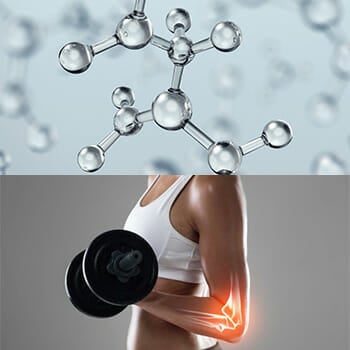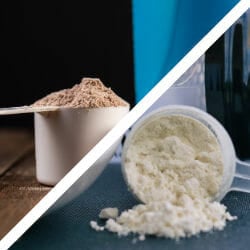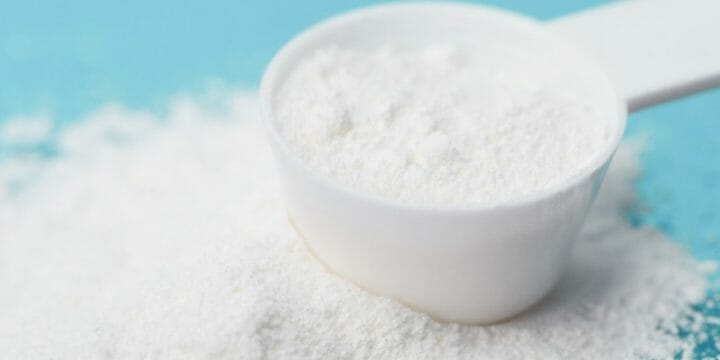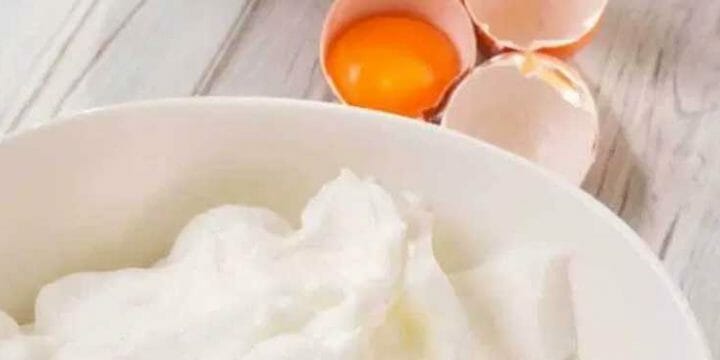Collagen protein powder is gaining popularity as an alternative to the more established choices for your morning protein shake and supplementation with food as a macronutrient.
But how is it different from whey protein powder? Should you be taking both, or is one a viable replacement for the other?
What do these different proteins provide?
We'll be looking into the debate concerning collagen protein vs. whey in depth below, so read on to find out more.
Quick Summary
- Both proteins can be used as meal replacements or protein shakes to reduce hunger and improve bone health, but whey protein is a complete protein source.
- Collagen protein powder and whey protein powder can both be used as protein supplements, with collagen being particularly beneficial for skin, hair, and joints due to its amino acid profile.
- According to the National Institutes of Health (NIH), collagen supplements can reverse the loss of collagen in the skin and have a positive impact on the appearance of cellulite.
- In my opinion, combining collagen and whey proteins seems like a smart approach to reap the benefits of both proteins, especially if you want to support various aspects of your health and fitness goals.
How Is Collagen Protein Similar To Whey?

I've personally found that both collagen protein powder and whey protein powder can serve the same fundamental purpose, depending on your fitness goals.
Depending on your goals and desired outcome, their differences mean that you may want to focus on one over the other or ideally take a blend of both. More on that later.
They can both be used as a meal replacement if your goal is cutting out high-calorie foods or a protein shake if you're after building lean mass.
Both and have been proven to reduce hunger and improve bone health, although the evidence is slightly stronger for collagen protein's effect on bones [1].
They are both rich in a broad spectrum of essential acids and are perfect for supplementation, although only whey protein powder is a complete protein source.
Related: Bone Broth Protein Powders
How Is Collagen Protein Different From Whey?
I've learned that despite being great protein supplements, collagen and whey protein have some significant differences. These differences primarily stem from their amino acid profiles and sources.
Whey protein is derived from milk and contains all 9 essential amino acids. It is a rich source of 20 different branch chain amino acids (BCAAs).
All of which makes it ideal for building lean muscles, mass, and improving recovery times at the gym. Collagen protein is derived from an animal source too, but rather from the bones, skin, and ligaments.
It has a higher concentration of the amino acids glycine, proline, and hydroxyproline, which increase collagen production in your own body and is typically found to be better for your skin, hair, skin, and joints.
Collagen Protein - The Pros and Cons
Pros

1. Supports Skins And Nails
From my personal experience, I've found that collagen protein powder is a fantastic supplement for those looking to not only feel great but also look their best. It plays a crucial role in maintaining healthy skin, hair, and nails.
Our skin is naturally 75% collagen, but after the age of 25, these collagen levels can decline by up to 30%.
In a study published by the National Institutes of Health (NIH), collagen supplements have been proven to reverse this loss and reduce the appearance of aging on the skin. A study has shown that it also has a positive impact on the appearance of cellulite [2].
If you want to stop your skin from becoming dull and wrinkly, then collagen supplements have a strong scientific link to doing just that.
2. Helps With Healthy Bones And Joints
While all protein is beneficial to muscle wasting and overall bone health, collagen protein has been proven to have a greater effect when taken by more senior citizens, and so is a better option if you're looking to regain the vigor of your youth.
Various studies have also shown collagen to help prevent age-related weight gain, help combat the effects of osteoporosis, reduce joint pain and joint damage, and generally promote healing.
Collagen makes up approximately 30 percent of the proteins within the human body, collagen is also a part of the connective tissue in the skin that helps [promote] firmness, suppleness, and constant renewal of skin cells.
- Sharon Richter, RD Nutritionist
We all go to the gym for different reasons, but let's accept that in some way all of us want to look and feel good. Collagen protein has strong proven links to providing the feel-good factor inside and out.
3. Improves Digestive Health
Just as it is an essential component of our skin, collagen is incredibly important for our insides, namely our organs and connective tissues.
A recent study published by the National Institutes of Health (NIH) found that those suffering from irritable bowel syndrome have low levels of collagen in the blood [3].
A theorized link between this and low collagen intake from their diet or treatment of the condition with collagen supplementation is being further researched.
Collagen has a proven positive effect on insulin sensitivity. Glycine, which is found in high levels in collagen protein, has been shown to improve vascular health, combat the damaging effect of fructose, and repair platelets.
Cons

1. Not Quite A Complete Protein
A significant drawback of collagen protein is that it only contains 8 of the 9 essential amino acids, and therefore cannot be labeled a complete protein.
This means that no matter how you look at it, it can only ever be used in addition to other protein supplements if you're looking to get the full effect.
It is much richer in certain amino acids listed above, but lacking in the BCAAs that are commonly found in almost all other protein supplements.
2. Not Easily Available On A Plant-Based Diet
This is a point that will either matter a lot to you or not at all, but another reason why collagen protein may never be as popular a choice as others is that it is currently almost impossible to source from plant-based foods.
There has been some progress in that department with some products combining different parts of vegan-friendly protein sources to mirror the amino acid structure of collagen.
However, science still has a way to go, and those who shy away from lab-based food or science aided sources will still want to avoid it.
In the meantime, the only true collagen source is from animal bone, skin, and connective tissue.
Whey Protein - The Pros and Cons
Pros

1. Better At Building Muscles
While both collagen protein and a whey protein can significantly help with building muscles, research has found that whey protein may be a better choice with exercise due to a higher increase in markers of protein synthesis [4].
This is thought to be due to the much higher concentration of leucine that is found in the amino acid structure of whey protein.
This means that when compared to collagen, and in fact many other protein supplements as well, whey strands up to the claim that is the best available protein source when it comes to aiding exercise and making significant gains down the gym.
2. Contains All Essential Amino Acids
We have already mentioned that whey protein is a complete protein source, containing all 9 essential amino acids, as well as being a rich source of 20 different BCAAs.
This has a positive impact on its efficacy on protein synthesis and muscle building, as mentioned above. It also means that it is a more diverse and convenient choice for supplementation.
To achieve the benefit you get from whey protein alone on collagen protein, you would need to support your supplement with other sources of everyone's favorite macronutrient, which sounds like more bother than it's worth for a lot of people.
3. Faster Absorption Rate
Another reason that whey protein is a favorite of the health and fitness crowd is due to its absorption rate. This refers to how quickly your body can break down the protein and utilize its benefits.
Thanks to how it is produced, whey protein already comes broken down into smaller molecules, so our body can make use of it a lot quicker and easier than with alternative protein sources.
For some, they claim this makes it a little easier to digest (counterargument incoming).
If you're looking for the best whey protein options available, check out our guide.

Cons

1. Not Gut-Friendly
While some may claim that due to its quick absorption rate, whey protein is easily digested. The evidence, on the contrary, is too difficult to ignore.
If you've spent any time at all in a gym locker room, you'll likely have been assaulted by both the verbal accounts and the very real physical effects that whey protein can have on the digestive system.
Due to it being derived from dairy and high in lactose, both those with dairy intolerance and even those without can find it quite hard to digest.
This is one of the major contributing factors that has led to the rise in the popularity of non-dairy protein options, which many argue are a lot easier on the stomach.
2. Full-Fat Option
Being milk-based and also still the most popular protein supplement available, there are very many whey protein options that are incredibly calorie-dense.
This may be due to added sugars and fats or other ingredients, but the fact is you have to be very careful in choosing your whey protein source.
There is also the fact that there are practically two different markets within the whey protein world, one for meal replacement and dieting, and one for use at the gym.
These different goals have a different ingredient list and calorie count, which is another reason to keep your eye on the label.
Can You Take Both Whey Protein And Collagen Protein Together?

Yes, in fact, if you are looking to get the best benefit from both, I would recommend combining collagen and whey proteins.
The two proteins are similar enough to act in the same primary purpose as a protein supplement but different enough in their amino acid structure that they go about it in different ways.
If you are looking to take both, then you can do so separately with one shake of whey in the evening or timed to coincide with your workout regime, and one protein-boosting collagen shake in the morning.
Alternatively, you could also mix your regular shakes with one part collagen to two parts whey to get the best of both worlds.
Recommended protein powders:
References:
- https://pubmed.ncbi.nlm.nih.gov/25976422/
- https://www.ncbi.nlm.nih.gov/pmc/articles/PMC4685482/
- https://www.ncbi.nlm.nih.gov/pmc/articles/PMC9722391/
- https://www.ncbi.nlm.nih.gov/pubmed/29757056
About The Author
You May Also Like






